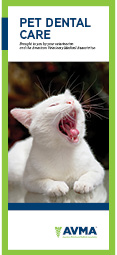Animal Clinic of La Plata
Veterinarian
Animal Clinic of La Plata
Veterinarian
/animal-clinic-of-laplata/images/image-u88e3.jpeg)
Services - Dentistry
Dental health is a very important part of your pet’s overall health, and dental problems can cause, or be caused by, other health problems. Your pet’s teeth and gums should be checked at least once a year by your veterinarian to check for early signs of a problem and to keep your pet’s mouth healthy.
Dental disease, specifically periodontal disease, is the most common ailment affecting pet dogs and cats. According to the American Veterinary Dental Society, more than 80% of dogs and 70% of cats develop gum disease by the age of three years. Periodontal disease can have a serious impact on both your pet's well-being and general health.
If left untreated, dental disease can not only be painful and inhibit proper nutrition, but it can also lead to serious systemic issues that may threaten your pet's overall health before symptoms are noticeable. For those reasons, we strongly consider dental care an important piece of your dog's or cat's preventive health care program.
Your Pet's Dental Examination at the Animal Clinic of La Plata - - -
Just like in humans, infection and inflammation of the gums and supporting tissues of the teeth are caused by bacteria present in plaque and tartar. When tartar builds up on your pet's teeth, it can lead to bad breath, bleeding, receding gums, and even eventual tooth loss.
Our veterinarians and staff believe the centerpiece of good dental care is a complete oral exam followed by a thorough cleaning designed to remove plaque and slow its buildup.
Should we find any issues, such as evidence of gum or tooth erosion, gingivitis, or excessive plaque buildup, we will discuss this with you and offer treatment options.
Caring for Your Pet's Teeth and Gums at Home
Brushing your pet's teeth is the single most important procedure you can do to maintain good oral health. If performed regularly, brushing dramatically decreases the incidence of gingivitis and can increase the interval between teeth cleaning appointments.
If you are unsure of how to brush your pet's teeth, please ask a staff member for instructions. We're happy to help.
Signs of Pet Dental Problems
Classic "doggy breath" is not necessarily normal. Halitosis, or bad breath, is the most common sign of dental disease.
The major cause of halitosis is periodontal disease. This is an infection of the gums and potentially the other supporting
structures of the teeth. Plaque builds up every day on the tooth surface including at the gum line.
Left in place, the plaque can mineralize, or harden, in less than 2 days, forming calculus or tartar. The continued build-up
of tartar above and below the gum line can eventually produce an environment for certain types of bacteria that may be
more destructive to the periodontal tissues and also produce a more noticeable odor.
Other symptoms of dental disease include:
If your pet is experiencing any of the above symptoms, please call us today at (301) 932-1881 for an appointment, so your pet does not needlessly spend any more time suffering with oral discomfort.

/animal-clinic-of-laplata/images/dental-cleaning-a357e.png)
/animal-clinic-of-laplata/images/BGAH-enewsletter-graphics-sept18-dental-e1538696630964-z3b54.png)
/animal-clinic-of-laplata/images/science-diet-food-c50c2.jpg)